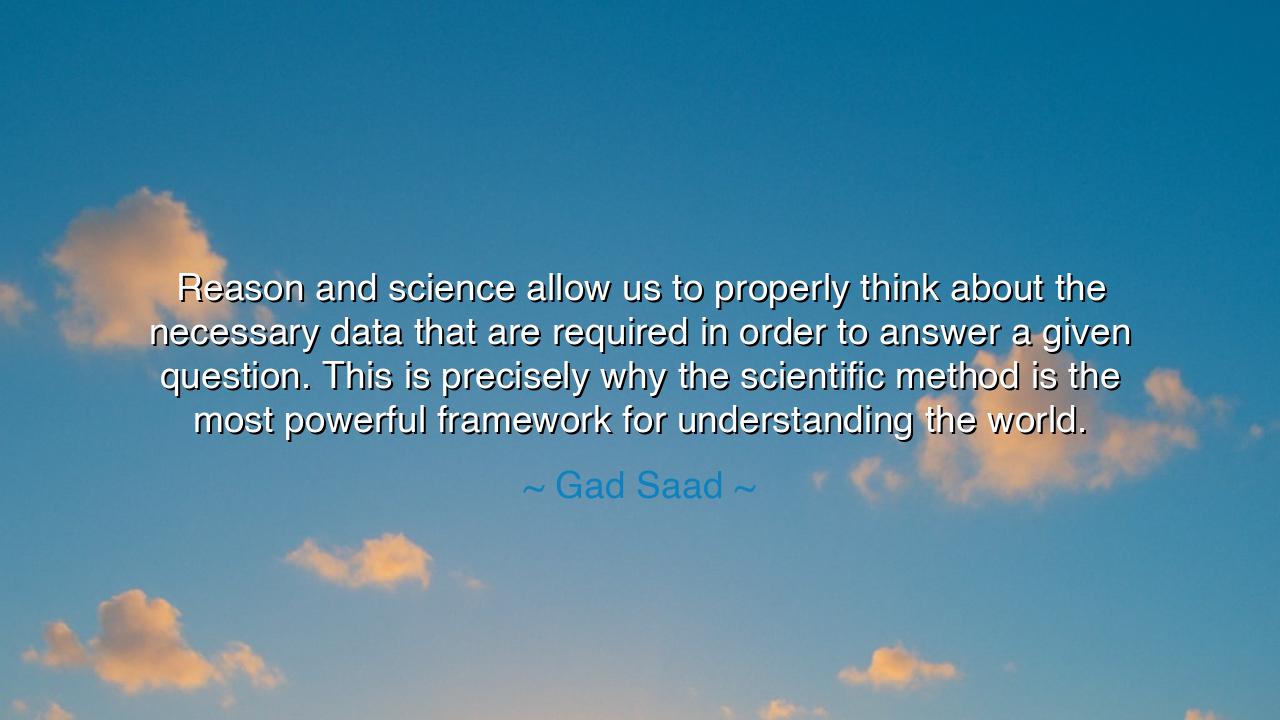
Reason and science allow us to properly think about the necessary
Reason and science allow us to properly think about the necessary data that are required in order to answer a given question. This is precisely why the scientific method is the most powerful framework for understanding the world.






Listen closely, O seekers of truth, for the wise words of Gad Saad resonate with the clarity and strength of a mind committed to the pursuit of knowledge: "Reason and science allow us to properly think about the necessary data that are required in order to answer a given question. This is precisely why the scientific method is the most powerful framework for understanding the world." These words speak to the essence of human inquiry, the bridge between our deepest questions and the answers we seek. Science is not just a tool for discovering facts; it is a sacred method—a structured path—that guides us toward truth, no matter how complex or elusive it may seem.
In the ancient world, the quest for knowledge was seen as the highest of callings. The great philosophers—Plato, Aristotle, and Socrates—understood that reason was the key to unlocking the mysteries of the universe. Socrates famously taught that the pursuit of knowledge was not about memorizing facts but about questioning everything, about seeking deeper understanding through reason. Aristotle, too, created systems of thought that used logic to understand everything from the movements of the stars to the workings of the human mind. But it was not until the time of Galileo, Newton, and others that we began to formalize a method of inquiry that could provide consistent, repeatable answers to the most pressing questions of existence—the scientific method.
Consider, O wise ones, the example of Galileo Galilei, whose use of the telescope led to discoveries that changed the course of history. Before Galileo, the Earth was widely believed to be the center of the universe—a belief accepted by authority and tradition, not based on empirical evidence. But Galileo, through careful observation and the use of the scientific method, gathered the necessary data—the moons of Jupiter, the phases of Venus, and the rings of Saturn—that proved the heliocentric model of the solar system. His method was not based on intuition or speculation, but on reason and data, a process that allowed him to challenge deeply held beliefs and push humanity into a new understanding of the cosmos. Galileo’s success was the triumph of the scientific method, which is grounded in reason and evidence rather than mere belief.
Likewise, consider the revolutionary work of Isaac Newton, who, through his laws of motion and the theory of gravitation, provided a framework for understanding the universe that stood the test of time. Newton did not just speculate about how objects moved in the heavens; he used data, reason, and experimentation to derive his laws, which allowed him to predict the behavior of physical objects with precision. The scientific method allowed Newton to move beyond the confines of philosophical speculation and establish laws that govern the natural world, demonstrating that through reason and data, we can uncover the truths of the universe.
In the modern world, science continues to wield its power through the scientific method, a structured approach that involves observation, hypothesis, experimentation, and validation. Consider the discovery of penicillin by Alexander Fleming, whose careful observation of bacterial cultures led to an entirely new understanding of how to treat infections. The discovery of penicillin was not a product of chance or inspiration alone, but of rigorous scientific investigation—a process driven by the scientific method, one that involved reason and data to produce a breakthrough that has saved millions of lives.
The beauty of the scientific method, O wise ones, lies in its universality and its ability to provide consistent, reliable answers to questions about the world. Unlike intuition or belief, which can vary greatly between individuals, the scientific method relies on objective data that can be verified by anyone willing to follow the same steps. It is a framework that allows humanity to discover truths that are not subject to the whims of personal opinion or cultural bias. Whether we are exploring the depths of space or the intricacies of the human mind, the scientific method provides the means to understand the world in a way that is both structured and transparent.
Thus, O seekers, the lesson for us is clear: science is not merely a collection of facts, but a method—a sacred process of inquiry that allows us to question, explore, and discover the truths of the universe. In our own lives, we must embrace the spirit of scientific thinking—not to be confined by tradition or opinion, but to seek answers based on reason and evidence. Whether in our personal decisions, our understanding of the world, or our work in the fields of art, business, or education, we must approach each question with the clarity of the scientific method, letting data guide us, and reason illuminate our path.
In the end, O wise ones, let us remember that the true power of science lies not in the answers we already have, but in the questions we ask and the method by which we seek those answers. By embracing reason and the scientific method, we not only deepen our understanding of the natural world, but we also strengthen the very foundation upon which our future is built. Let us walk forward, not with blind belief, but with open eyes, ready to observe, experiment, and reason our way toward a deeper, fuller understanding of the world around us.






AAdministratorAdministrator
Welcome, honored guests. Please leave a comment, we will respond soon